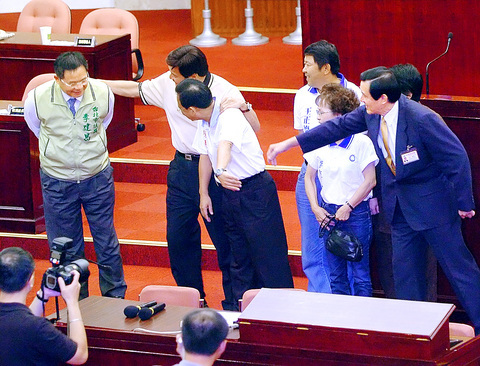Democratic Progressive Party (DPP) Taipei City councilors once again accused Taipei Mayor Ma Ying-jeou (
The mayor's bank account has increased by more than NT$1.06 million (US$30,000) over the past seven years because he funneled half his monthly special allowance fund into his personal account, the councilors claimed.
Ma receives a special allowance of NT$340,000 per month.

PHOTO: FANG PIN-CHAO, TAIPEI TIMES
"Why didn't you open another account for the special allowance fund? As a person who has pledged to fight corruption, you should hold yourself to a higher standard," Councilwoman Hsu Chia-chin (
Councilors Lee Chian-chang (
"The biggest problem is that you see the fund as your own personal fortune and don't return the money left over," Lee said.
The councilors also reiterated criticism over Ma paying the physical examination fee and other expenses to adopt his dog with money from the fund. The mayor has since reimbursed the fund for those fees.
Ma responded to the criticism by pointing out that he was subject to the same regulations that governed the special allowances allotted to the country's more than 6,000 top government officials -- which allowed officials to wire the money directly into personal accounts and only required them to provide receipts for half the expenditures.
"Premier Su Tseng-chang (蘇貞昌) receives his fund in the same way, too ? The issue is the regulations and that is not my problem," Ma said.
The mayor said that most of his special allowance was spent on public welfare.
Shih Su-mei (
"The regulations state that officials only need to provide receipts for half of the expenditures ? If the government changes its rules in the future, we will follow them," Shih said.
While Ma insisted that most of his fund money goes to public or charity events, Hsu questioned donations that Ma's wife's made to two foundations -- the Dwen An Social Welfare Foundation and New Taiwanese Cultural Foundation.
Both foundations were founded by the mayor.
"You used Taipei residents' money to make donations to your own foundations. Does that make any sense?" Hsu said.
The DPP councilors said they would ask the Ministry of Audit to examine Ma's expenditures.
Yesterday was the last time Ma was to answer questions in the City Council during his term as Taipei mayor.

The Ministry of Economic Affairs has fined Taobao NT$1.2 million (US$36,912) for advertisements that exceed its approved business scope, requiring the Chinese e-commerce platform to make corrections in the first half of this year or its license may be revoked. Lawmakers have called for stricter enforcement of Chinese e-commerce platforms and measures to prevent China from laundering its goods through Taiwan in response to US President Donald Trump’s heavy tariffs on China. The Legislative Yuan’s Finance Committee met today to discuss policies to prevent China from dumping goods in Taiwan, inviting government agencies to report. Democratic Progressive Party Legislator Kuo Kuo-wen (郭國文) said

The Ministry of Economic Affairs has fined Taobao NT$1.2 million (US$36,900) for advertisements that exceeded its approved business scope and ordered the Chinese e-commerce platform to make corrections in the first half of this year or its license would be revoked. Lawmakers have called for stricter supervision of Chinese e-commerce platforms and more stringent measures to prevent China from laundering its goods through Taiwan as US President Donald Trump’s administration cracks down on origin laundering. The legislature’s Finance Committee yesterday met to discuss policies to prevent China from dumping goods in Taiwan, inviting government agencies to report on the matter. Democratic Progressive Party

Taiwan and its Pacific ally Tuvalu on Tuesday signed two accords aimed at facilitating bilateral cooperation on labor affairs, according to Taiwan’s Ministry of Foreign Affairs (MOFA). The governments inked two agreements in Taipei, witnessed by Foreign Minister Lin Chia-lung (林佳龍) and visiting Deputy Tuvaluan Prime Minister Panapasi Nelesone, MOFA said in a news release. According to MOFA, the agreements will facilitate cooperation on labor issues and allow the two sides to mutually recognize seafarers’ certificates and related training. Taiwan would also continue to collaborate with Tuvalu across various fields to promote economic prosperity as well as the well-being of their

Sung Chien-liang (宋建樑), who led efforts to recall Democratic Progressive Party (DPP) Legislator Lee Kun-cheng (李坤城), was released on bail of NT$80,000 today amid outcry over his decision to wear a Nazi armband to questioning the night before. Sung arrived at the New Taipei District Prosecutors’ Office for questioning in a recall petition forgery case last night wearing a red armband bearing a swastika, carrying a copy of Adolf Hitler’s Mein Kampf and giving a Nazi salute. Sung left the building at 1:15am without the armband and covering the book with his coat. Lee said today that this is a serious